When Kole Tonnemaker’s grandfather Orland established the family orchard on the Frenchman Hills near Royal City, Washington, almost 50 years ago it was surrounded by nothing but sagebrush.
Orland worked as a Washington State University Extension agent in Ephrata in the 1950s when the Columbia Basin irrigation project was beginning to be established. He bought 132 acres of undeveloped land in 1962, a couple of years before he retired, and planted a small cherry, pear, and apple orchard five years later—despite being strongly discouraged from planting fruit trees in such an unsuitable location.
Today, Tonnemaker Family Farms is surrounded by large corporate orchards in what has since proven to be a prime tree-fruit production area.
Kole says as the bulk of the tree fruit industry consolidates, it’s left opportunities for a few small operators to stay small and sell directly to consumers.
Kole, 54, and his brother Kurt, 51, grew up working in the orchard. After graduating from the University of Idaho with a degree in plant science, Kole went to work with his grandfather at the farm. When Orland died suddenly in 1981, Kole was left in charge.
For a while, Kole sold his fruit through one of the state’s big fruit warehouses. After several years of poor returns in the late 1980s and early 1990s, the family decided to do their own marketing. Kurt heads the marketing effort while Kole and his family are in charge of production.
Along with 63 acres of apples, pears, cherries, and stone fruits, they have 25 acres of vegetables and 35 acres of hay, all organic.
Each week in the summer, Kurt and his elder son, Joseph, take their fruit and vegetables to 15 farmers’ markets in western Washington while Kole’s family sell at a few farm markets in eastern Washington and Idaho. Nowadays, some markets operate year round, and the Tonnemakers dry and freeze produce to sell throughout the winter. Their on-farm retail store at Dodson Road, though off the beaten track, is open year round.
Though selling the fruit themselves is far more work than simply hauling it to the warehouse, Kole feels it’s worthwhile.
“We’ve tried to take responsibility for whether we make a profit or not, rather than just being upset that it didn’t sell for enough when it went to the warehouse,” he said. “We came to a fork in the road where you could either get a lot more acreage and make a little bit off an acre or farm more intensively. We chose to farm more intensively.”
In recent years, Washington fruit growers have enjoyed good returns from their warehouse, but Kole is still committed to direct marketing. A bonus is that they meet their customers face to face and get feedback about how people enjoy eating their fruit.
“It makes you feel you’re doing something that’s worthwhile,” Kole said. “And sometimes that’s more important than making a huge amount of money.”
Customers appreciate that the food is fresh, they know where it comes from, and they have an opportunity to interact with the grower, he said.
Taste
“I think it really changes how you approach what you grow, how you grow it, and how you harvest it when you’re going to deal face to face with the person who eats it,” said Kole. “Our focus is on things that taste good. That’s our primary concern.”
The Tonnemakers have earned several accolades. They received the 2011 Local Hero Award from Edible Seattle magazine and, in November, they were named Farmers of the Year by Washington Tilth.
Kole said when he took over the farm in the 1980s, he used a conventional pest control program, but worried that it consisted of a spray for whatever ailed you, and pests were developing resistance to insecticides.
“We really needed to look for a better way to do it,” he said.
He adopted mating disruption for codling moth as soon as it became available in the early 1990s and shifted to other softer pest controls. Their operation has been certified organic since 1997.
“For a number of years we used IPM (integrated pest management) practices, but the average consumer didn’t really understand that,” he said. “That’s a hard thing to explain, but people understand organic.”
At least, they think they do. Kole said he gets lots of questions, a common one being, “Are you organic, or do you spray?” to which he responds that pests don’t leave growers alone just because they’re organic.
Fertility is an important factor in growing good-tasting produce, he said. Using organic fertilizers, such as composted chicken manure, it’s more difficult to overdo the fertility than with synthetic fertilizers. The challenge is to maintain good vigor in the trees.
Weed control is achieved through tilling and flaming. The emphasis of disease control must be prevention by pruning to open up the canopy and applying products such as sulfur and potassium bicarbonate every week. There’s no organic product that will control diseases after they take hold.
“You have to be on top of things and anticipate the problems, rather than waiting until they get out of hand,” he said. “There are definitely things that are extremely challenging, and I really believe this is a very humbling way to make a living.”
Kole and Sonia’s elder son, Luke, 24, has joined the business and is learning about production while developing ideas about how to enhance the direct marketing.
Kole said he and his wife felt they could continue to make a living doing what they were doing, but if they wanted to enhance the business, they needed to have someone they felt comfortable representing them to take charge. Having young people, like Luke and their assistant Amanda Smith, involved gives them more options in terms of what they can potentially do.
“I value others’ opinions and their vision of what we need to do,” Kole said. “When you have one person, you’re really limited by the imagination that one person has. It’s too narrow.”
Luke said he wasn’t sure when he went to college that he wanted to go back to the farm, but when he graduated from the University of Idaho with degrees in nutrition and psychology, he decided it was the thing to do. It was an opportunity that not many young people have to carry on the farming tradition.
Kole said they have that opportunity because of the foresight of Orland and his wife, Pearl, who selected a good site for the orchard with light soil and good air drainage—a site that produces good-tasting fruit.
“I think we might be the only place on the Royal Slope where the family makes their living off one farm unit any more,” he said. “I think it’s a tribute to my grandparents’ vision. They’re the foundation of everything that’s happened here.” •

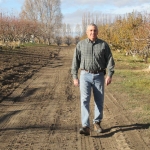
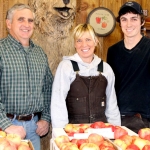
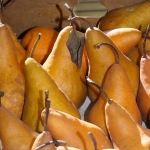
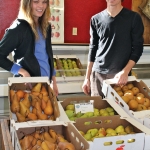
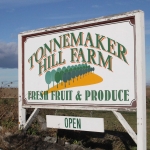





Leave A Comment